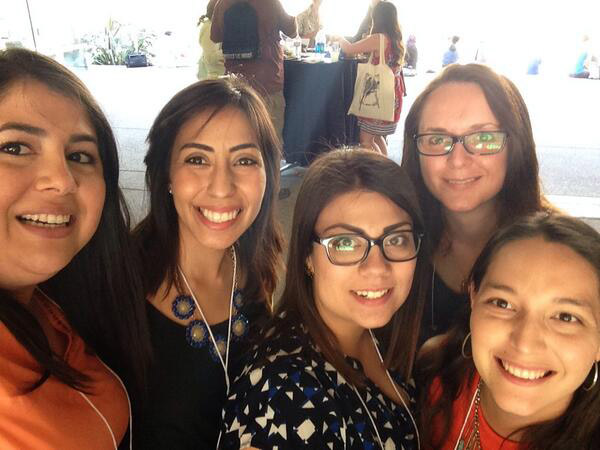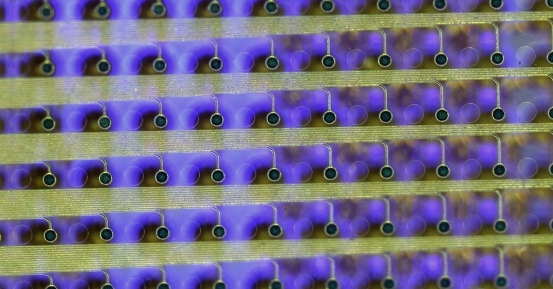
Published Date
Share This:
Connecting for the ‘Common Core’ Good
UC San Diego conference on new school standards brings together local educators

Image from Twitter: @MaestraBarrett http://t.co/4gE4Uzmlrk
This month—all around San Diego County and the state—elementary, middle and high school students are hunkering down in front of computers and tablets to field-test new assessments in mathematics and English language arts. These tests are part of the Common Core State Standards newly being implemented in California. The new standards, along with California’s Next Generation Science Standards, which will be required of all California public schools by 2016, endeavor to move students toward deeper learning and represent the most profound change to affect education in 25 years.
Recognizing the need to support area K-12 colleagues during this critical time, UC San Diego’s department of education studies and the Center for Research on Educational Equity, Assessment and Teaching Excellence (CREATE) hosted a free conference for nearly 350 local educators on May 3.
The “Implementing Innovative Strategies in the Era of the Common Core and NGSS Conference” gave local educators an opportunity to learn about each other’s work as well as that of university colleagues, and build new connections for moving forward.
“As educators grapple with these shifts in their own schools and districts, there is a tremendous call from them to connect with one another—to share early lessons and innovations, as well as the stumbling blocks,” said Susan Yonezawa, associate director for CREATE and one of four conference coordinators. “But few such networks exist for schools and busy educators who are too often isolated from one another. “
The conference, co-sponsored by the UC San Diego Noyce Program, provided a needed forum, at no cost to teachers, bringing together educators and administrators from across grade levels, districts, regions and subject areas to learn together.
About half of the conference speakers were alumni of education studies at UC San Diego, many of them leaders in their own schools and districts today, leading the charge to revamp classroom practices.
Many were also educators who have close ties to CREATE through longstanding educational outreach efforts and the new CREATE STEM Success Initiative, an effort to investigate and fill leaks in the K-20 STEM pipeline in the San Diego region, especially in areas serving underrepresented and low-income students.
Carolyn Hofstetter, a faculty member of education studies and also a conference organizer, welcomed part of the crowd along with Mica Pollock, professor of education studies and director of CREATE. “This conference is about the power of innovative education that clearly runs strong in San Diego,” Hofstetter said.
“This is a moment for educator creativity and leadership in shaping teaching and learning,” Pollock added. “If you believe in these standards, it’s a moment to stand up for deep learning—by students and by teachers. … This is a moment for us to band together in professional development as a region, with teachers teaching teachers. This is also a moment for pursuing equity—deep learning by every student and all groups of students.”
Sessions ranged over many topics in Common Core. Education studies faculty member Rusty Bresser, for example, led a session on Common Core-style elementary math with alumna Alison Antenorcruz, now a primary teacher at Fay Elementary School in San Diego Unified School District. “We’re going to move from ‘I just memorized this procedure’ to ‘I really understand the math’,” Bresser said. “The teacher challenge will be finding the balance between helping kids understand concepts, and getting them to be really good at procedures.”
In other rooms, educators and administrators explored what it really means to teach and learn science according to the research behind the Next Generation Science Standards. “NGSS asks every student to inquire like scientists about real-world phenomena,” said San Diego Science Project director Cristina Trecha, who co-led a session with San Diego County Office of Education science coordinator John Spiegel, “Gearing Up for the NGSS.” No longer is science just about learning a body of known facts, Trecha explained: Teachers need to create a classroom culture that values student thinking and provides hands-on opportunities for students to engage in the key “practices of science and engineering” such as developing and using models, constructing explanations, designing solutions, and engaging in argument from evidence.
“Because our district hasn’t implemented the NGSS yet,” said Michelle Baun, biology teacher at Chaparral High School in Temecula, “it was nice to hear about what we’re going to do. The session presenters showed us how and why the new standards were written, which will help us understand how we’ll be implementing them.”
Commenting on a Common Core workshop, Ana Gray, a 6th grade teacher at Emerson Bandini Elementary, said, “The session gave me several real-world examples I could take back to my classroom. I liked the partner talk and collaboration.”
A lively post-lunch keynote was delivered by Christine Kane, co-director of the San Diego Area Writing Project and founder of San Diego Global Vision Academies. Kane spoke of her school’s early work with the new standards.
Conference coordinator Rachel Millstone, also on the faculty in UC San Diego’s department of education studies, summed it up: “It was exciting to see teachers and principals from throughout the county working together to educate each other.”
Given the tremendous response to the conference, the organizers are already discussing the possibility of supporting more gatherings with teachers working with the new standards.
Share This:
You May Also Like
Stay in the Know
Keep up with all the latest from UC San Diego. Subscribe to the newsletter today.


